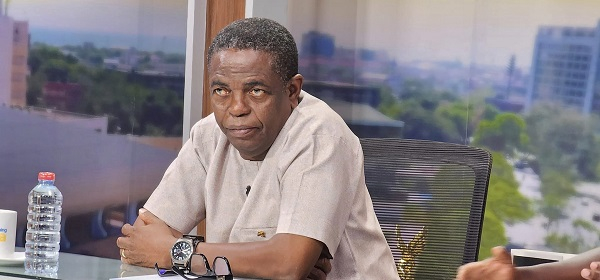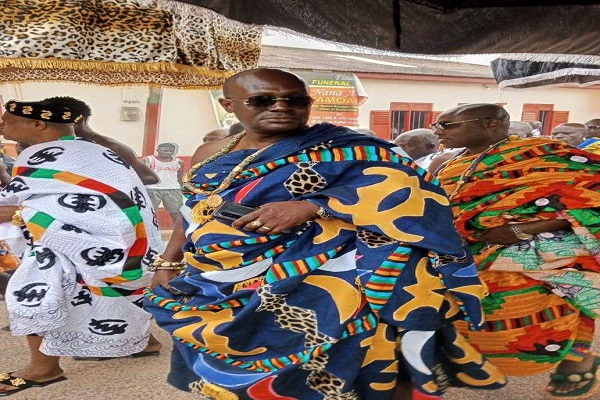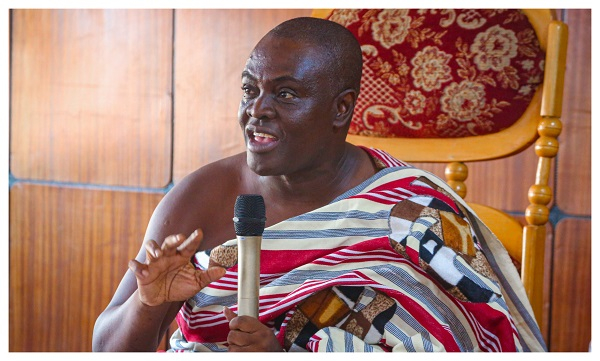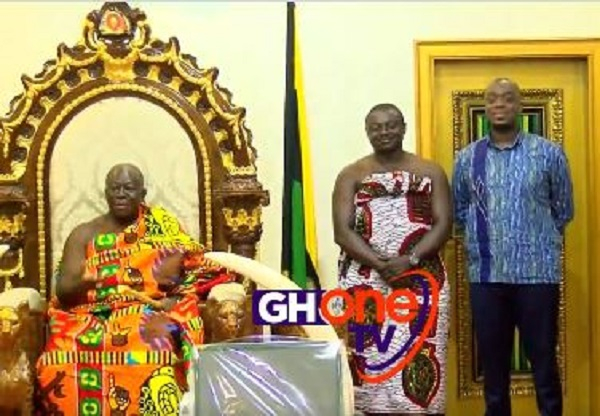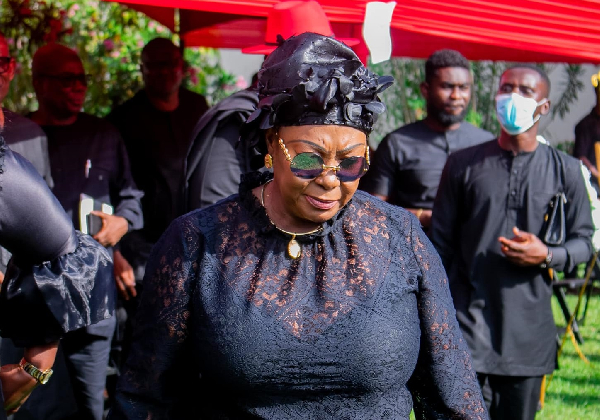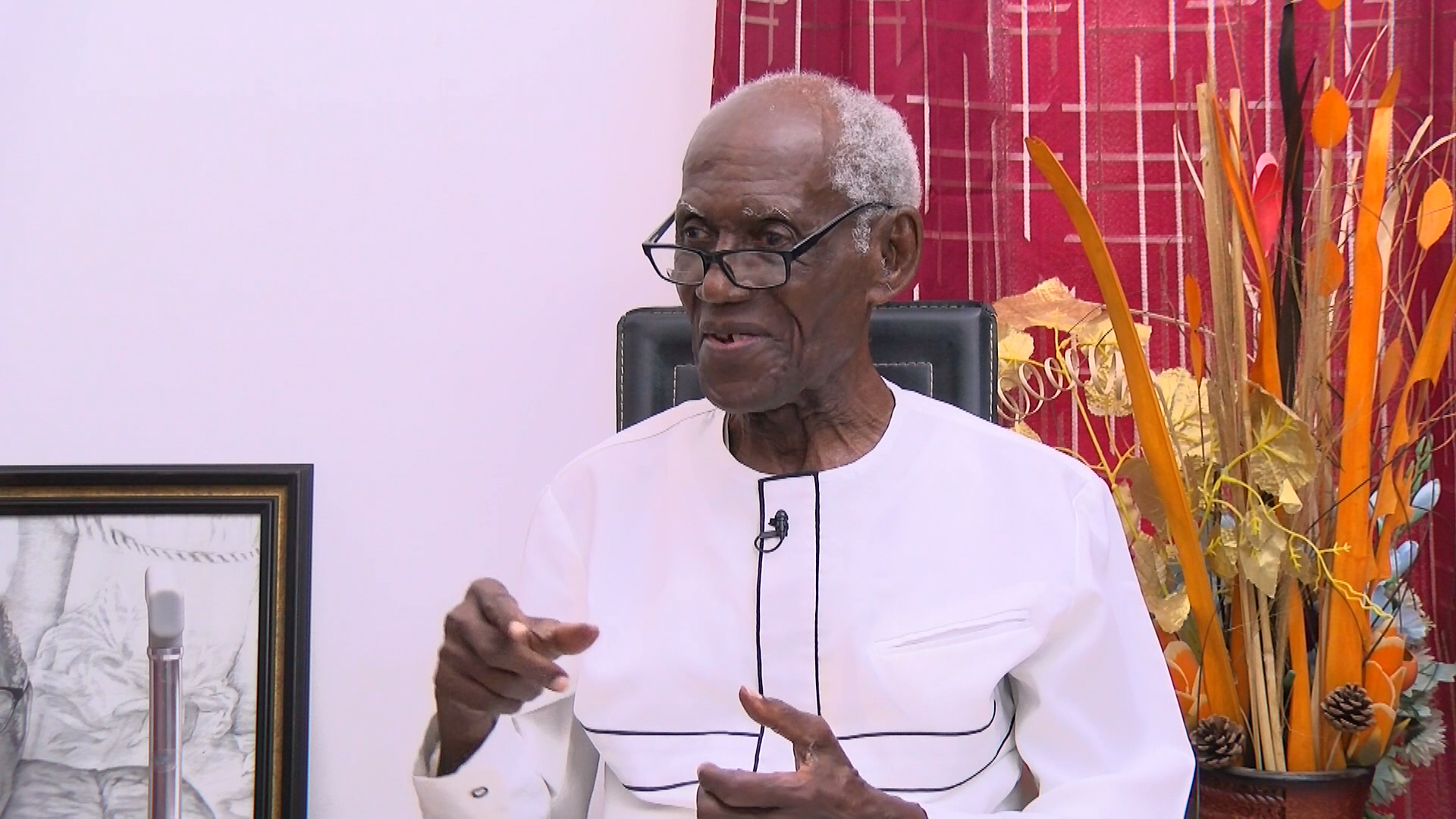
Joe Lartey Sr: A voice that brought life to Ghana sports and beyond

My wife is 91," he
"She's two years older than me," he chuckles.
Joe Lartey Sr and his wife at their Kwame Nkrumah Flat residenceHe would later share his love story, a stint in the British Navy at 16, and his "very strict," upbringing.
All these encompassed to produce a man, in the annals of Ghanaian history, amidst the fervour of sports and the grandeur of ceremonials, his name is etched in the hearts of many—a name that resonates with the essence of passion and eloquence.
Joe Lartey Sr, a titan in the realm of sports commentary, not only brought the games to life through his voice but also etched his mark on Ghana's football cultural fabric.
He defined commentary his own way and brought life to homes afar but near through his microphone.
So, When I began the journey of a documentary on how Asante Kotoko and Hearts of Oak became sworn rivals despite the geographical gap seven years ago, it would have been incomplete without the input of Mr Lartey who commentated on this game for years.
Joe Lartey Sr speaking to Muftawu Nabila Abdulai on how Kwame Nkrumah developed the African Union idea.Do not ask where you can watch it.
It is a documentary that never was because the hard drive got lost and took away my soul and desire to execute it.
The cast: 1971 African Player of the Year and Kotoko legend, Ibrahim Sunday, Hearts of Oak and Asante legend, Rev.
Osei Kofi, Hearts of Oak legends, Doodo Ankrah and Albert Ankrah (a member of Hearts' famous three musketeers), veteran journalist, Ken Bediako, master of the microphone, Joe Lartey Sr, former Black Star captain, Wilberforce Mfum.
I made arrangements to speak to Kofi Badu and now late Dogo Moro, and boom...
This reminder has just torn me into pieces, but we are here for Joe Lartey, the man whose life was simple, but mighty and influenced many generations.
"My upbringing was rather strict," he recalled recently in a Prime Take interview.
"My dad as well as my mother, were very strict, so strict that I had an English friend who nicknamed my dad as 'kill Joy father' because I wasn't allowed to do many things.
'"I wasn't allowed to go to the cinema, I wasn't allowed to do sports, I wasn't allowed to practice music," he states.
"I remember one day," he began the narration of an emotionally traumatising experience with his father.
"I went to my brother-in-law's house to play organ and when I came back, my dad gave me a good hiding.
We had met there and from there we started the march to the Castle, and when we got to the crossroads, there was this man, Emery, a white man, he was in charge of a platoon of policemen and he ordered them to stop us going to the Castle when they didn't, he ordered them to shoot but they refused to so he took the rifle from one of them and short Adjetey and the rest.
"It was it was something that you should see, not describe.
"It was scary," he says.
This was on 28th February 1948.
He was a terrific writer and if you ask me I'll say he had a poisonous pen.
"When Dr Busia became prime minister of this country, his writings were some of the factors that got Busia out.
"He could write, and his command of the English language, superb," he notes.
That's how powerful their pens were, but Joe would even be more impactful with his microphone when he eventually decided to join GBC.
"I was in journalism from 1961, professionally, that was when I joined the GBC," he recalls.
He was not hired by GBC to speak to masses but to write and edit for readers.
"Initially," he starts the story of his journey to professional journalism, "I wasn't going to to be with the sports Department.
I was sent to the Talks and Features Department and I was writing stories, and editing the stories that other people wrote from outside," he continued.
Fate intervened, and Lartey found himself thrust into the world of sports commentary, thanks to the keen eye of his mentor, Festus Addai, who later joined the army and became a Kennel.
"Somebody took ill in the sports department under a man called Festus Addai," the story begins.
"He was in charge of a sports Department.
The sports Department was known as the Outside Broadcast Department, OBs.
"The main thing they did was sports and ceremonials, so somebody felt sick in the OBs Department and was out of work and I was asked to go on relieving duties at the OBs, so I went and after the man was about returning to the department, Festus Addai I refused to let me go back because he thought I was a good material for the OBs department.
"There was a tug of war between him and the head of programmes, a very tough guy called Joe Gartey, he was the head of programmes.
"Eventually, Festus won the tussle and I was asked to stay in the OBs department then I took up the commentary."
Joe Lartey S celebrated by AIPs for his outstanding contribution to sports journalismWhat followed was a symphony of words woven with finesse, as Lartey's voice transcended mere commentary, becoming a melody that captivated listeners and painted vivid portraits of not just sporting events.
He narrated these events with unparalleled fervour.
His partnership with Festus Addai, characterised by a seamless exchange of words and emotions, transformed broadcasts into immersive experiences, leaving an indelible mark on the memories of all who tuned in.
One of the defining moments of Lartey's career came during the historic visit of Queen Elizabeth II to Ghana—an event that stirred the nation's soul and ignited fervent debates.
From his vantage point atop a scaffold, alongside esteemed colleagues, Addai of the GBC and Godfrey Talbot of the BBC, Lartey witnessed history unfold as the Queen's arrival marked a pivotal moment in Ghana's narrative.
With his velvet voice resonating across the airwaves, Lartey captured the essence of the moment, immortalising it for generations to come.
"When the Queen arrived," he recalls.
"She introduced me to wherever we found ourselves."
Joe Lartey was not just about football and its narration; he served as an encyclopedia of Ghana's rich history.
His life embodied class.
Today, as we reflect on the legacy of Joe Lartey Sr, we are reminded not only of his unparalleled talent but also of the profound impact he had on the cultural landscape of Ghana.
His voice, a symphony of emotion and eloquence, continues to echo through the corridors of time, a timeless reminder of the power of storytelling and the enduring spirit of a nation united in its love for sports.
In the fabric of Ghanaian history, amidst the tumult of the ages, one name stands tall—a name whispered with reverence and spoken with admiration—the name of Joe Lartey Sr, the man who brought life to Ghana sports through his voice.
He played life for 90 minutes plus 6 minutes of added time and was on the path to 97th-minute in June before the final whistle.
He joins his boss, Festus Addai to continue the "Over To You," at a place far away from the microphone.
They will meet in the land of the dead with their velvet voices and bring joy to those who admired their chemistry and are with them in the silent world.
